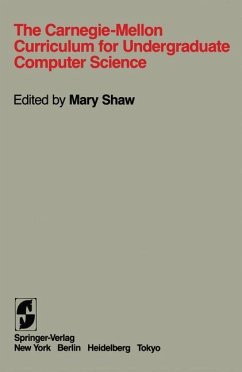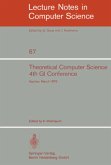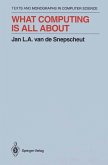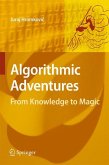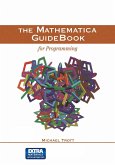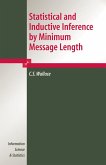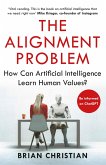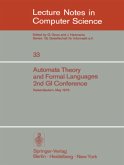S. D. Brookes, M. Donner, J. Driscoll
The Carnegie-Mellon Curriculum for Undergraduate Computer Science
Herausgegeben von Shaw, Mary
S. D. Brookes, M. Donner, J. Driscoll
The Carnegie-Mellon Curriculum for Undergraduate Computer Science
Herausgegeben von Shaw, Mary
- Broschiertes Buch
- Merkliste
- Auf die Merkliste
- Bewerten Bewerten
- Teilen
- Produkt teilen
- Produkterinnerung
- Produkterinnerung
This curriculum and its description were developed during the period 1981 - 1984
Andere Kunden interessierten sich auch für
![Theoretical Computer Science Theoretical Computer Science]() Theoretical Computer Science20,99 €
Theoretical Computer Science20,99 €![What Computing Is All About What Computing Is All About]() Jan L. A. van de SnepscheutWhat Computing Is All About65,99 €
Jan L. A. van de SnepscheutWhat Computing Is All About65,99 €![Algorithmic Adventures Algorithmic Adventures]() Juraj HromkovicAlgorithmic Adventures42,99 €
Juraj HromkovicAlgorithmic Adventures42,99 €![The Mathematica Guidebook for Programming The Mathematica Guidebook for Programming]() Michael TrottThe Mathematica Guidebook for Programming113,99 €
Michael TrottThe Mathematica Guidebook for Programming113,99 €![Statistical and Inductive Inference by Minimum Message Length Statistical and Inductive Inference by Minimum Message Length]() C.S. WallaceStatistical and Inductive Inference by Minimum Message Length189,99 €
C.S. WallaceStatistical and Inductive Inference by Minimum Message Length189,99 €![The Alignment Problem The Alignment Problem]() Brian ChristianThe Alignment Problem11,99 €
Brian ChristianThe Alignment Problem11,99 €![Automata Theory and Formal Languages Automata Theory and Formal Languages]() Automata Theory and Formal Languages20,99 €
Automata Theory and Formal Languages20,99 €-
-
-
This curriculum and its description were developed during the period 1981 - 1984
Hinweis: Dieser Artikel kann nur an eine deutsche Lieferadresse ausgeliefert werden.
Hinweis: Dieser Artikel kann nur an eine deutsche Lieferadresse ausgeliefert werden.
Produktdetails
- Produktdetails
- Verlag: Springer / Springer New York / Springer, Berlin
- Artikelnr. des Verlages: 978-0-387-96099-9
- 1984.
- Seitenzahl: 216
- Erscheinungstermin: 20. November 1984
- Englisch
- Abmessung: 235mm x 155mm x 12mm
- Gewicht: 305g
- ISBN-13: 9780387960999
- ISBN-10: 0387960996
- Artikelnr.: 33119455
- Herstellerkennzeichnung
- Books on Demand GmbH
- In de Tarpen 42
- 22848 Norderstedt
- info@bod.de
- 040 53433511
- Verlag: Springer / Springer New York / Springer, Berlin
- Artikelnr. des Verlages: 978-0-387-96099-9
- 1984.
- Seitenzahl: 216
- Erscheinungstermin: 20. November 1984
- Englisch
- Abmessung: 235mm x 155mm x 12mm
- Gewicht: 305g
- ISBN-13: 9780387960999
- ISBN-10: 0387960996
- Artikelnr.: 33119455
- Herstellerkennzeichnung
- Books on Demand GmbH
- In de Tarpen 42
- 22848 Norderstedt
- info@bod.de
- 040 53433511
1. Introduction and Overview.- 1.1 Goals of the Curriculum Design.- 1.2. Educational Philosophy.- 1.3. Character of the Curriculum.- 1.4. Innovations in the Curriculum.- 1.5. Organization of the Book.- 2. The Nature of Computer Science.- 2.1. Working Definition of Computer Science.- 2.2. A View of Future Computing.- 3. Roles for Universities.- 3.1. The Audience.- 3.2. Use of Computing Technology in Education.- 3.3. The ACM and IEEE Curricula.- 4. Objectives for the Curriculum.- 4.1. Premises.- 4.2. Goals.- 5. The Content of Computer Science.- 5.1. Basics.- 5.2. Elementary Computer Science.- 5.3. Liberal Professional Education.- 5.4. Advanced Computer Science.- 6. Program Organization.- 6.1. Requirements.- 6.2. Advice on the Use of Electives.- 6.3. Program Flexibility.- 6.4. Sample Program.- 7. Curriculum'78-Is Computer Science Really that Unmathematical?.- 7.1. Curriculum '78 and Mathematics.- 7.2. Mathematics for Computer Scientists.- 8. Mathematics Curriculum and the Needs of Computer Science.- 8.1. Some Words about Computer Science.- 8.2. Mathematical Aspects of Undergraduate Computer Science.- 8.3. Some Remarks about Computer Science and Mathematics Curricula.- 8.4. Conclusion.- 9. Theory and Practice in the Fundamental Computer Science Course.- 9.1. Introduction.- 9.2. Course Overview.- 9.3. Major topics in the Fundamental Structures Course.- 9.4. Experiences.- 9.5. Conclusions.- 10. Remarks on the Design.- 10.1. General Philosophy.- 10.2. Relation to Traditional Courses.- 10.3. Course Organization and Style.- 10.4. Course Numbering Scheme.- 11. Course Descriptions.- 11.1. Basic and Introductory Courses.- 11.2. Elementary and Intermediate Computer Science Courses.- 11.3. Advanced Computer Science Courses.- 12. Related Courses.- 12.1. Mathematics Courses.-12.2. Statistics Courses.- 12.3. Electrical Engineering Courses.- 12.4. Psychology Courses.- 12.5. Engineering and Public Policy Courses.- 12.6. Engineering Courses.
1. Introduction and Overview.- 1.1 Goals of the Curriculum Design.- 1.2. Educational Philosophy.- 1.3. Character of the Curriculum.- 1.4. Innovations in the Curriculum.- 1.5. Organization of the Book.- 2. The Nature of Computer Science.- 2.1. Working Definition of Computer Science.- 2.2. A View of Future Computing.- 3. Roles for Universities.- 3.1. The Audience.- 3.2. Use of Computing Technology in Education.- 3.3. The ACM and IEEE Curricula.- 4. Objectives for the Curriculum.- 4.1. Premises.- 4.2. Goals.- 5. The Content of Computer Science.- 5.1. Basics.- 5.2. Elementary Computer Science.- 5.3. Liberal Professional Education.- 5.4. Advanced Computer Science.- 6. Program Organization.- 6.1. Requirements.- 6.2. Advice on the Use of Electives.- 6.3. Program Flexibility.- 6.4. Sample Program.- 7. Curriculum'78-Is Computer Science Really that Unmathematical?.- 7.1. Curriculum '78 and Mathematics.- 7.2. Mathematics for Computer Scientists.- 8. Mathematics Curriculum and the Needs of Computer Science.- 8.1. Some Words about Computer Science.- 8.2. Mathematical Aspects of Undergraduate Computer Science.- 8.3. Some Remarks about Computer Science and Mathematics Curricula.- 8.4. Conclusion.- 9. Theory and Practice in the Fundamental Computer Science Course.- 9.1. Introduction.- 9.2. Course Overview.- 9.3. Major topics in the Fundamental Structures Course.- 9.4. Experiences.- 9.5. Conclusions.- 10. Remarks on the Design.- 10.1. General Philosophy.- 10.2. Relation to Traditional Courses.- 10.3. Course Organization and Style.- 10.4. Course Numbering Scheme.- 11. Course Descriptions.- 11.1. Basic and Introductory Courses.- 11.2. Elementary and Intermediate Computer Science Courses.- 11.3. Advanced Computer Science Courses.- 12. Related Courses.- 12.1. Mathematics Courses.-12.2. Statistics Courses.- 12.3. Electrical Engineering Courses.- 12.4. Psychology Courses.- 12.5. Engineering and Public Policy Courses.- 12.6. Engineering Courses.

